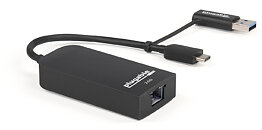Monday, March 30th 2020
Plugable Announces 2.5 GbE USB 3.1 Adapter
Today Plugable is launching its first next-generation 2.5 Gigabit networking device, the Plugable 2.5 Gbps USB Ethernet Adapter (USBC-E2500). With USB-C and USB 3.0 (USB-A) connectivity included, you can quickly and affordably upgrade nearly any modern workstation or laptop with more than double the performance of a traditional Gigabit Ethernet connection.
While most Ethernet adapters only support 1 Gigabit link rates, this USB adapter supports wired speeds up to 2.5 times faster than the 1 Gbps standard when used with Cat 5e cabling (commonly found in existing network environments), and a 2.5 Gbps-capable router or switch. With 2.5 Gbps routers still somewhat rare in home environments, users who would benefit from the increased network throughput—but don't wish to yet invest in a 2.5 Gbps router or switch—can use 2 of these adapters to create a direct peer-to-peer network between 2 systems. With this increased performance, users can take advantage of advances in high-speed networking and storage technologies, without requiring a difficult or expensive setup.We are only in the early stages of the shift to 2.5 Gbps network equipment arriving in our homes and workplaces, but you're likely to see much wider adoption of 2.5 Gbps network equipment supporting the 2.5GBASE-T / 802.3bz standard in the year ahead. Our 2.5 Gbps USB Ethernet adapter allows you to future-proof your setup while also being backwards compatible with current 1 Gbps network environments. This adapter is ideal for early adopters—and IT professionals—to modernize their network environment with higher network throughput, without needing to run new cables. It also benefits users such as content creators whose work may be bottlenecked by 1 Gbps network transfer rates.
Our USBC-E2500 2.5 Gbps USB network adapter can connect to a system with USB-C ports, and also includes an attached USB-C to USB 3.0 (USB-A) adapter, allowing you to easily use it with any type of USB port you may have (USB 3.0 required for full performance). The adapter is backwards compatible with earlier networking standards such as Gigabit (10/100/1000) networks, and supports key features such as jumbo frames, auto-negotiation, and is compatible with both full-duplex and half-duplex networks, making it an ideal choice for current and future network connectivity.
The 2.5 Gbps USB network adapter works with all modern versions of Windows (10, 8.x, and 7), macOS (10.12 and above), and Linux (kernel 3.2 and above). Please be aware a driver download and installation (using an existing network interface, or with a USB flash drive) may be required on some OS and kernel versions.
The Plugable 2.5 Gigabit USB Ethernet Adapter is available in the US on Amazon.com (with a limited time $10 off coupon), NewEgg, Walmart, and globally on Amazon Canada, UK, EU, Australia, and Japan. For business buyers, it's also available through distribution via Ingram Micro.
While most Ethernet adapters only support 1 Gigabit link rates, this USB adapter supports wired speeds up to 2.5 times faster than the 1 Gbps standard when used with Cat 5e cabling (commonly found in existing network environments), and a 2.5 Gbps-capable router or switch. With 2.5 Gbps routers still somewhat rare in home environments, users who would benefit from the increased network throughput—but don't wish to yet invest in a 2.5 Gbps router or switch—can use 2 of these adapters to create a direct peer-to-peer network between 2 systems. With this increased performance, users can take advantage of advances in high-speed networking and storage technologies, without requiring a difficult or expensive setup.We are only in the early stages of the shift to 2.5 Gbps network equipment arriving in our homes and workplaces, but you're likely to see much wider adoption of 2.5 Gbps network equipment supporting the 2.5GBASE-T / 802.3bz standard in the year ahead. Our 2.5 Gbps USB Ethernet adapter allows you to future-proof your setup while also being backwards compatible with current 1 Gbps network environments. This adapter is ideal for early adopters—and IT professionals—to modernize their network environment with higher network throughput, without needing to run new cables. It also benefits users such as content creators whose work may be bottlenecked by 1 Gbps network transfer rates.
Our USBC-E2500 2.5 Gbps USB network adapter can connect to a system with USB-C ports, and also includes an attached USB-C to USB 3.0 (USB-A) adapter, allowing you to easily use it with any type of USB port you may have (USB 3.0 required for full performance). The adapter is backwards compatible with earlier networking standards such as Gigabit (10/100/1000) networks, and supports key features such as jumbo frames, auto-negotiation, and is compatible with both full-duplex and half-duplex networks, making it an ideal choice for current and future network connectivity.
The 2.5 Gbps USB network adapter works with all modern versions of Windows (10, 8.x, and 7), macOS (10.12 and above), and Linux (kernel 3.2 and above). Please be aware a driver download and installation (using an existing network interface, or with a USB flash drive) may be required on some OS and kernel versions.
The Plugable 2.5 Gigabit USB Ethernet Adapter is available in the US on Amazon.com (with a limited time $10 off coupon), NewEgg, Walmart, and globally on Amazon Canada, UK, EU, Australia, and Japan. For business buyers, it's also available through distribution via Ingram Micro.


6 Comments on Plugable Announces 2.5 GbE USB 3.1 Adapter
I was quite skeptical, to be honest, but it seems LAN is going 2.5 Gbps next year. Not bad.
2.5GbE will work on common Cat 5e cables, it'll be cheap to implement in devices. And, as more and more PCs and routers are launched with 2.5GbE support, it'll become the standard mainstream ethernet.
10GbE has been around for roughly 15 years. It's too expensive for mainstream adoption in consumer hardware. Even enterprise LANs are mostly 1Gbps.
You're probably one of those people who don't 4-core CPUs still being made. Correct? :)
Then we have thermals. 2.5Gbps controllers have similar thermals to 1Gbps controllers, whereas 10Gbps controllers get HOT. Even 5Gbps controllers get really toasty.
Cost is also an issue, as 2.5Gbps will have very similar cost as 1Gbps controllers to make, whereas 10Gbps and 5Gbps controllers are expensive to make.
There's also the cabling issue, where 2.5Gbps Ethernet works fine over Cat 5e, but 10Gbps ideally need Cat 6A.
So yeah, it might be easy for you and me (I use 10Gbps between my PC and NAS) to use 10Gbps at home, it's not going to be the case for everyone else. Most people simply don't care about Ethernet at this point, hence why we're seeing 802.11ax routers with 1Gbps Ethernet, yet they claim speeds of up to something stupid like 4.8Gbps (which isn't going to happen).
Somehow Wi-Fi is the thing people care about and that's why we're seeing these insane routers now that costs $500+.
2.5Gbps Ethernet controller
10Gbps Ethernet controller
But I guess they know many people will just see the "2X THE SPEED" part and have no idea that 99% of things that bottleneck at 1GbE will bottleneck at 2.5GbE too. This is especially bad for businesses where the people making the purchasing decisions often don't understand the technology, 2GbE has no place in a corporate environment.
IMO 2.5GbE should be left as just a speed that 5GbE and 10GbE auto negotiate down to if the connection is bad (yes I know early 10GbE devices couldn't do that) and the minimum for new adapters should be 5GbE as that actually makes a worthwhile diff over 1GbE. Especially with the prices of switches with a couple of 5GbE or 10GbE ports getting better all the time.
Having said all that, I do wish somebody would make a USB 10GbE adapter for laptops without thunderbolt ports, yeah it would be bottlenecked by the interface like USB2.0 1GbE adapters were but it would elevate the bottleneck of 5GbE in most cases.Ideally but in practice only if the Cat5e run is over fifty meters, and if it is modern devices will auto negotiate down to 5GbE anyway (though you should set that manually if you know its going to be an issue).